University History Essay: The Age of Exploration and Global Impact
VerifiedAdded on 2021/06/18
|5
|1147
|29
Essay
AI Summary
This essay delves into the Age of Exploration, examining its transformative impact on European society, politics, and economy. It highlights the motivations behind the voyages, including the pursuit of trade, colonization, and the spread of Christianity, while also acknowledging the decline of feudalism and the rise of new economic and social needs. The essay discusses key figures like Prince Henry the Navigator, Vasco da Gama, and Christopher Columbus, and explores the positive outcomes such as the discovery of new lands and the growth of European prosperity. However, it also critically analyzes the negative consequences, including the extraction of raw materials, the rise of slavery, and the disruption of global stability, concluding that the Age of Exploration ushered in modernity while simultaneously inflicting lasting damage on the rest of the world.
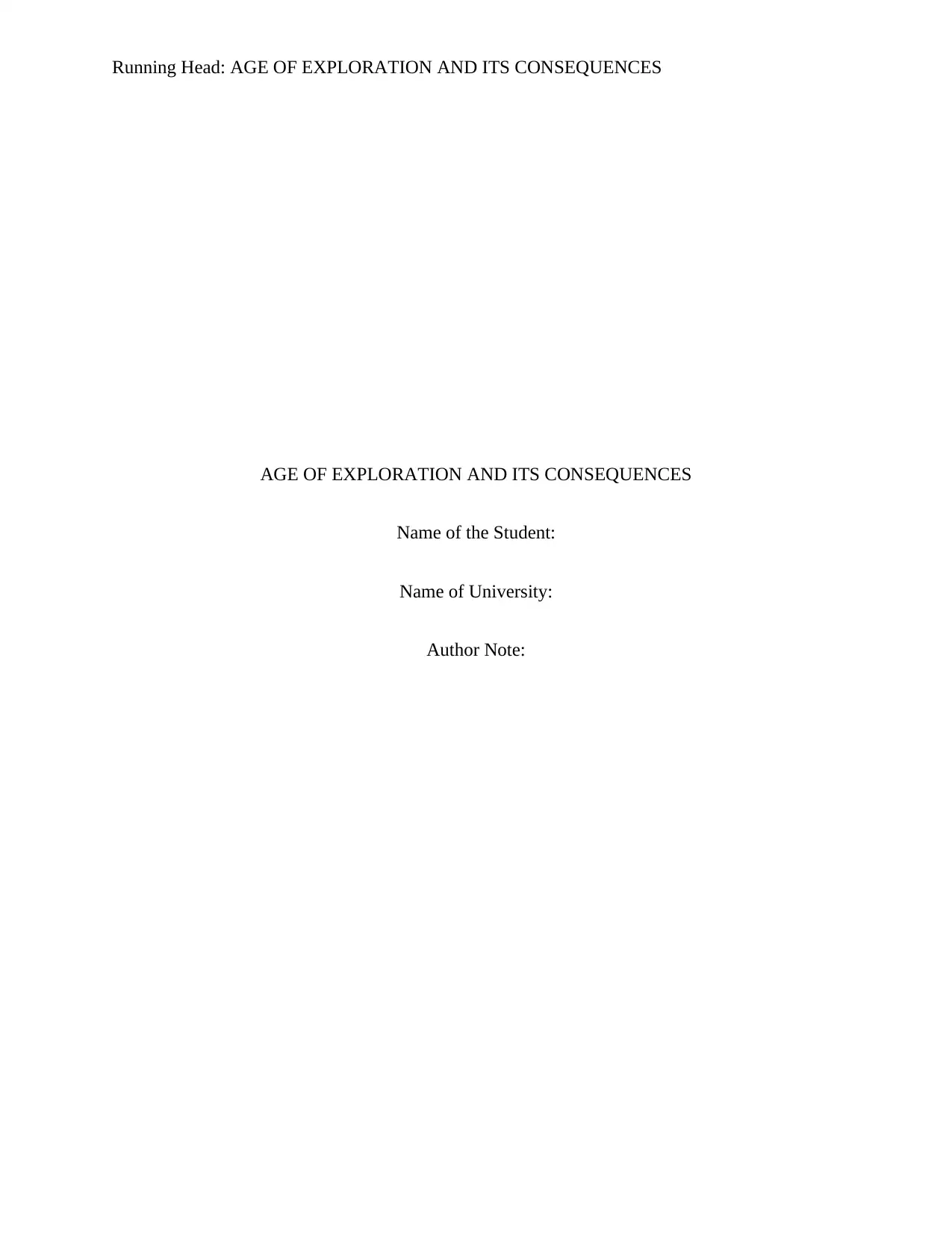
Running Head: AGE OF EXPLORATION AND ITS CONSEQUENCES
AGE OF EXPLORATION AND ITS CONSEQUENCES
Name of the Student:
Name of University:
Author Note:
AGE OF EXPLORATION AND ITS CONSEQUENCES
Name of the Student:
Name of University:
Author Note:
Paraphrase This Document
Need a fresh take? Get an instant paraphrase of this document with our AI Paraphraser
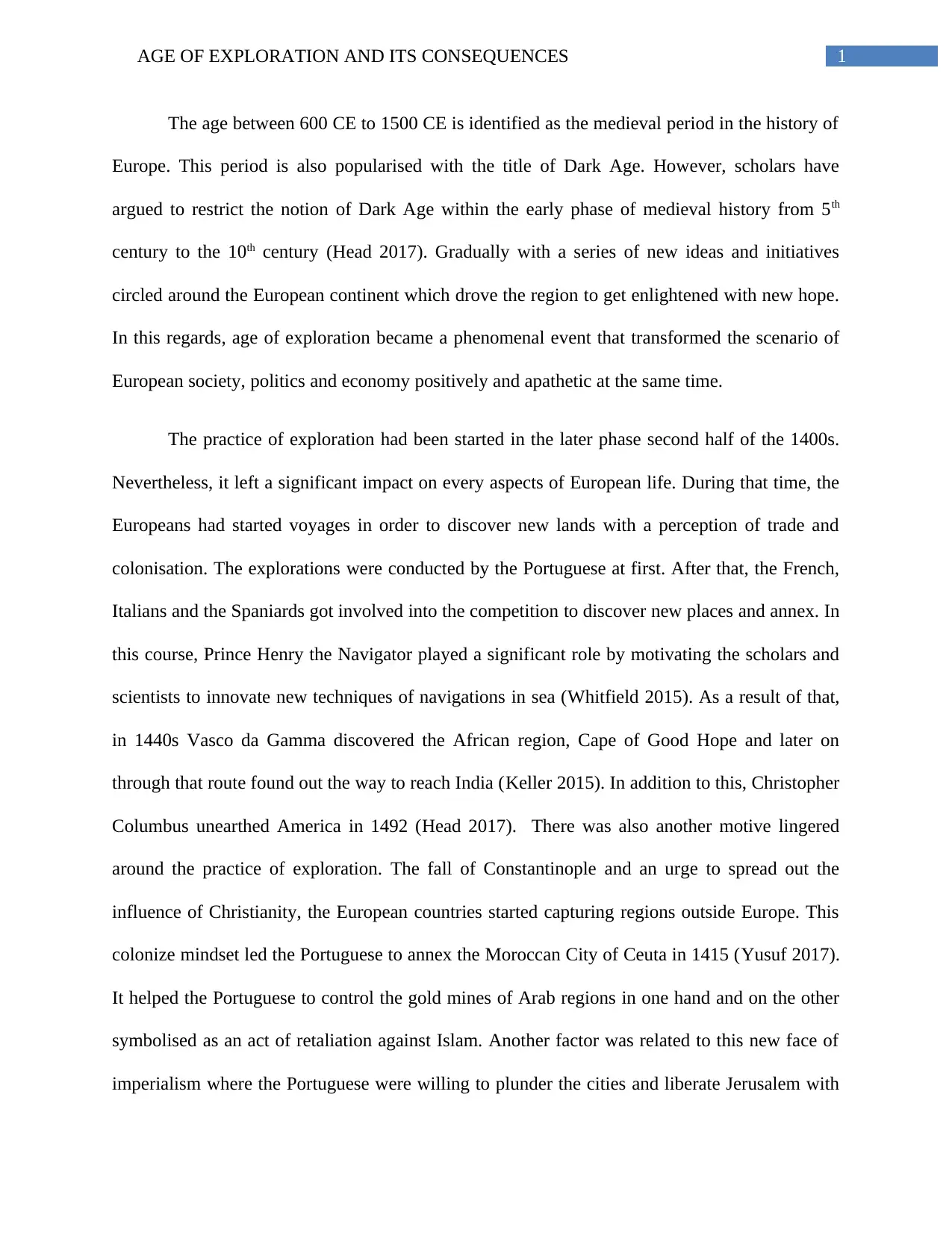
1AGE OF EXPLORATION AND ITS CONSEQUENCES
The age between 600 CE to 1500 CE is identified as the medieval period in the history of
Europe. This period is also popularised with the title of Dark Age. However, scholars have
argued to restrict the notion of Dark Age within the early phase of medieval history from 5th
century to the 10th century (Head 2017). Gradually with a series of new ideas and initiatives
circled around the European continent which drove the region to get enlightened with new hope.
In this regards, age of exploration became a phenomenal event that transformed the scenario of
European society, politics and economy positively and apathetic at the same time.
The practice of exploration had been started in the later phase second half of the 1400s.
Nevertheless, it left a significant impact on every aspects of European life. During that time, the
Europeans had started voyages in order to discover new lands with a perception of trade and
colonisation. The explorations were conducted by the Portuguese at first. After that, the French,
Italians and the Spaniards got involved into the competition to discover new places and annex. In
this course, Prince Henry the Navigator played a significant role by motivating the scholars and
scientists to innovate new techniques of navigations in sea (Whitfield 2015). As a result of that,
in 1440s Vasco da Gamma discovered the African region, Cape of Good Hope and later on
through that route found out the way to reach India (Keller 2015). In addition to this, Christopher
Columbus unearthed America in 1492 (Head 2017). There was also another motive lingered
around the practice of exploration. The fall of Constantinople and an urge to spread out the
influence of Christianity, the European countries started capturing regions outside Europe. This
colonize mindset led the Portuguese to annex the Moroccan City of Ceuta in 1415 (Yusuf 2017).
It helped the Portuguese to control the gold mines of Arab regions in one hand and on the other
symbolised as an act of retaliation against Islam. Another factor was related to this new face of
imperialism where the Portuguese were willing to plunder the cities and liberate Jerusalem with
The age between 600 CE to 1500 CE is identified as the medieval period in the history of
Europe. This period is also popularised with the title of Dark Age. However, scholars have
argued to restrict the notion of Dark Age within the early phase of medieval history from 5th
century to the 10th century (Head 2017). Gradually with a series of new ideas and initiatives
circled around the European continent which drove the region to get enlightened with new hope.
In this regards, age of exploration became a phenomenal event that transformed the scenario of
European society, politics and economy positively and apathetic at the same time.
The practice of exploration had been started in the later phase second half of the 1400s.
Nevertheless, it left a significant impact on every aspects of European life. During that time, the
Europeans had started voyages in order to discover new lands with a perception of trade and
colonisation. The explorations were conducted by the Portuguese at first. After that, the French,
Italians and the Spaniards got involved into the competition to discover new places and annex. In
this course, Prince Henry the Navigator played a significant role by motivating the scholars and
scientists to innovate new techniques of navigations in sea (Whitfield 2015). As a result of that,
in 1440s Vasco da Gamma discovered the African region, Cape of Good Hope and later on
through that route found out the way to reach India (Keller 2015). In addition to this, Christopher
Columbus unearthed America in 1492 (Head 2017). There was also another motive lingered
around the practice of exploration. The fall of Constantinople and an urge to spread out the
influence of Christianity, the European countries started capturing regions outside Europe. This
colonize mindset led the Portuguese to annex the Moroccan City of Ceuta in 1415 (Yusuf 2017).
It helped the Portuguese to control the gold mines of Arab regions in one hand and on the other
symbolised as an act of retaliation against Islam. Another factor was related to this new face of
imperialism where the Portuguese were willing to plunder the cities and liberate Jerusalem with
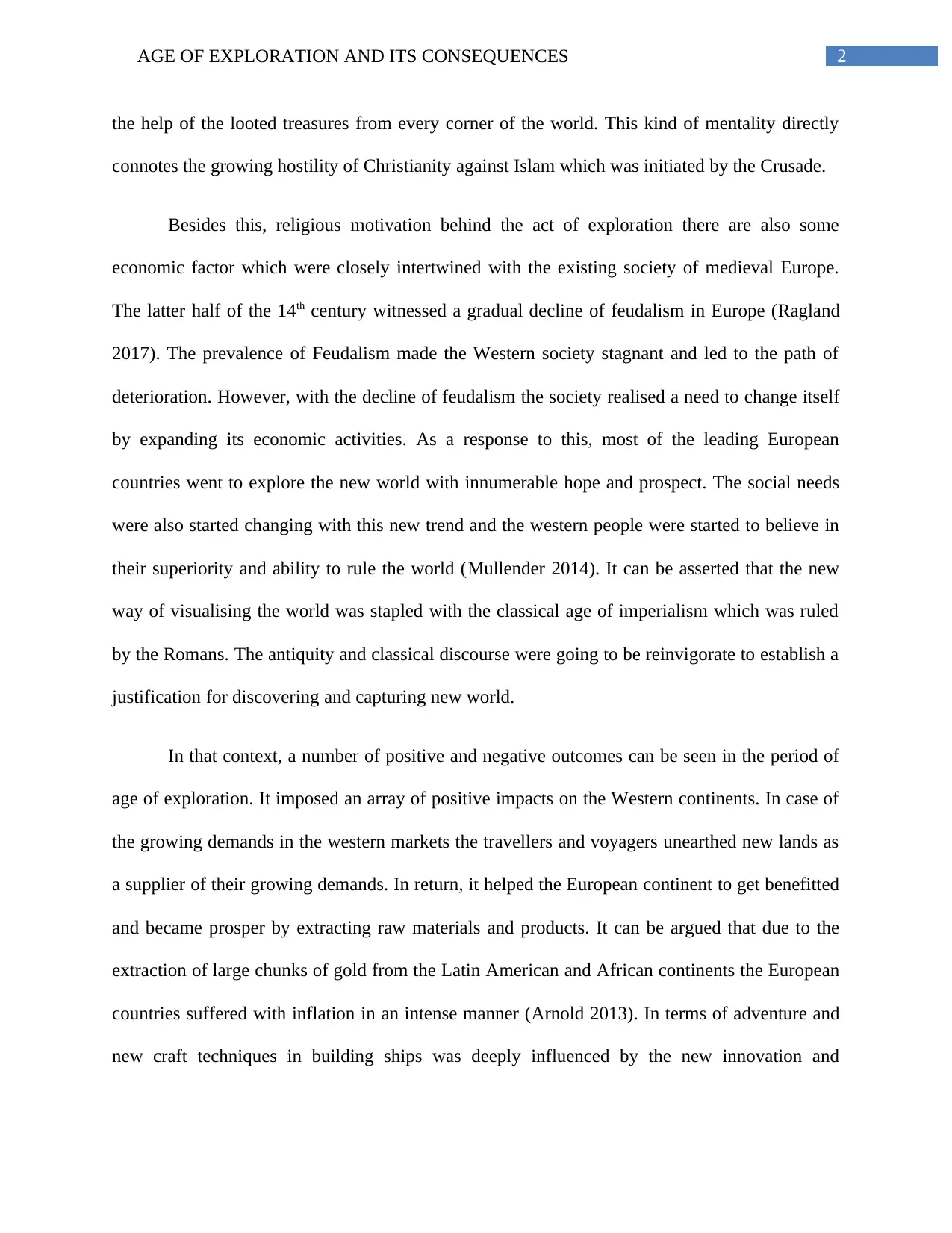
2AGE OF EXPLORATION AND ITS CONSEQUENCES
the help of the looted treasures from every corner of the world. This kind of mentality directly
connotes the growing hostility of Christianity against Islam which was initiated by the Crusade.
Besides this, religious motivation behind the act of exploration there are also some
economic factor which were closely intertwined with the existing society of medieval Europe.
The latter half of the 14th century witnessed a gradual decline of feudalism in Europe (Ragland
2017). The prevalence of Feudalism made the Western society stagnant and led to the path of
deterioration. However, with the decline of feudalism the society realised a need to change itself
by expanding its economic activities. As a response to this, most of the leading European
countries went to explore the new world with innumerable hope and prospect. The social needs
were also started changing with this new trend and the western people were started to believe in
their superiority and ability to rule the world (Mullender 2014). It can be asserted that the new
way of visualising the world was stapled with the classical age of imperialism which was ruled
by the Romans. The antiquity and classical discourse were going to be reinvigorate to establish a
justification for discovering and capturing new world.
In that context, a number of positive and negative outcomes can be seen in the period of
age of exploration. It imposed an array of positive impacts on the Western continents. In case of
the growing demands in the western markets the travellers and voyagers unearthed new lands as
a supplier of their growing demands. In return, it helped the European continent to get benefitted
and became prosper by extracting raw materials and products. It can be argued that due to the
extraction of large chunks of gold from the Latin American and African continents the European
countries suffered with inflation in an intense manner (Arnold 2013). In terms of adventure and
new craft techniques in building ships was deeply influenced by the new innovation and
the help of the looted treasures from every corner of the world. This kind of mentality directly
connotes the growing hostility of Christianity against Islam which was initiated by the Crusade.
Besides this, religious motivation behind the act of exploration there are also some
economic factor which were closely intertwined with the existing society of medieval Europe.
The latter half of the 14th century witnessed a gradual decline of feudalism in Europe (Ragland
2017). The prevalence of Feudalism made the Western society stagnant and led to the path of
deterioration. However, with the decline of feudalism the society realised a need to change itself
by expanding its economic activities. As a response to this, most of the leading European
countries went to explore the new world with innumerable hope and prospect. The social needs
were also started changing with this new trend and the western people were started to believe in
their superiority and ability to rule the world (Mullender 2014). It can be asserted that the new
way of visualising the world was stapled with the classical age of imperialism which was ruled
by the Romans. The antiquity and classical discourse were going to be reinvigorate to establish a
justification for discovering and capturing new world.
In that context, a number of positive and negative outcomes can be seen in the period of
age of exploration. It imposed an array of positive impacts on the Western continents. In case of
the growing demands in the western markets the travellers and voyagers unearthed new lands as
a supplier of their growing demands. In return, it helped the European continent to get benefitted
and became prosper by extracting raw materials and products. It can be argued that due to the
extraction of large chunks of gold from the Latin American and African continents the European
countries suffered with inflation in an intense manner (Arnold 2013). In terms of adventure and
new craft techniques in building ships was deeply influenced by the new innovation and
⊘ This is a preview!⊘
Do you want full access?
Subscribe today to unlock all pages.

Trusted by 1+ million students worldwide
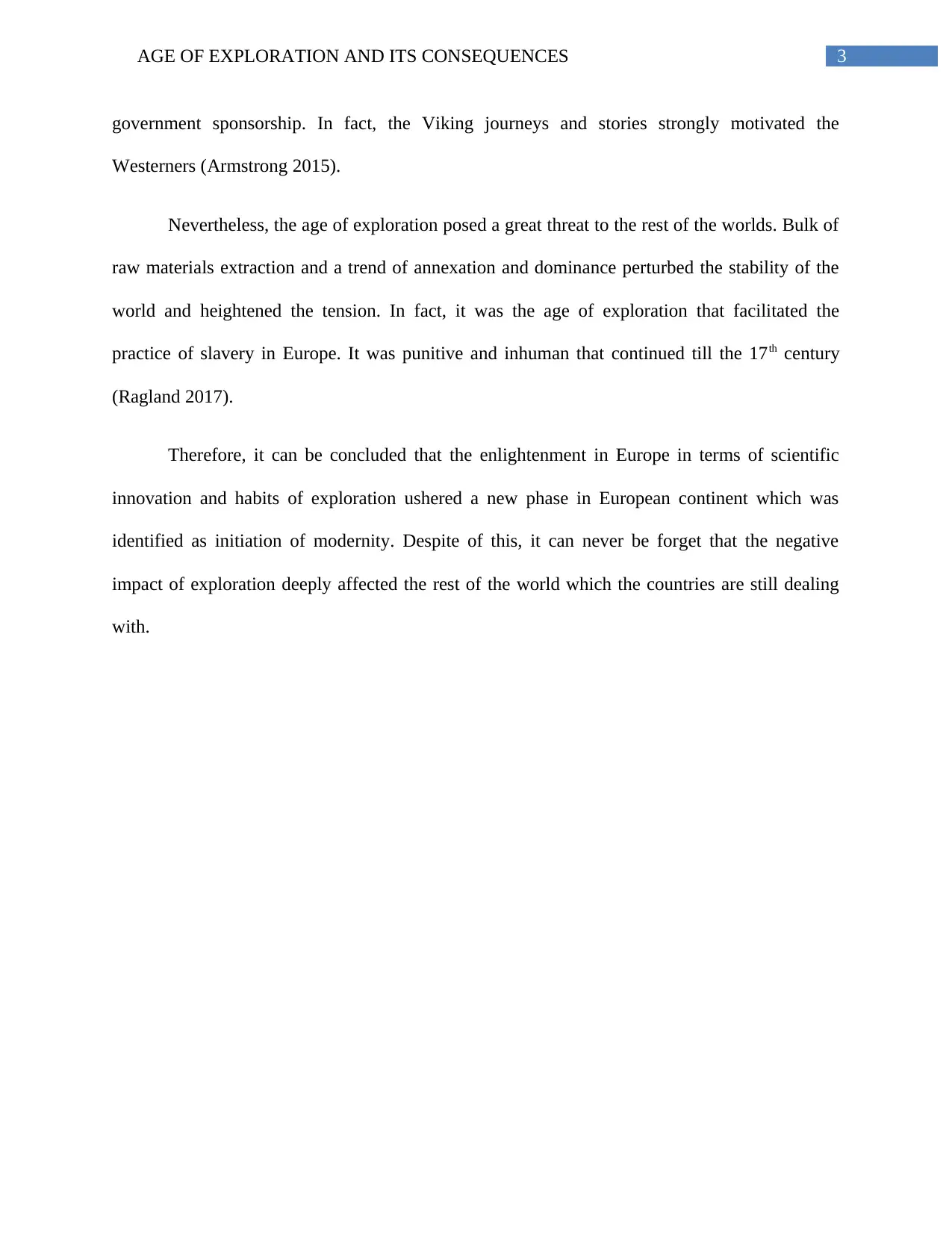
3AGE OF EXPLORATION AND ITS CONSEQUENCES
government sponsorship. In fact, the Viking journeys and stories strongly motivated the
Westerners (Armstrong 2015).
Nevertheless, the age of exploration posed a great threat to the rest of the worlds. Bulk of
raw materials extraction and a trend of annexation and dominance perturbed the stability of the
world and heightened the tension. In fact, it was the age of exploration that facilitated the
practice of slavery in Europe. It was punitive and inhuman that continued till the 17th century
(Ragland 2017).
Therefore, it can be concluded that the enlightenment in Europe in terms of scientific
innovation and habits of exploration ushered a new phase in European continent which was
identified as initiation of modernity. Despite of this, it can never be forget that the negative
impact of exploration deeply affected the rest of the world which the countries are still dealing
with.
government sponsorship. In fact, the Viking journeys and stories strongly motivated the
Westerners (Armstrong 2015).
Nevertheless, the age of exploration posed a great threat to the rest of the worlds. Bulk of
raw materials extraction and a trend of annexation and dominance perturbed the stability of the
world and heightened the tension. In fact, it was the age of exploration that facilitated the
practice of slavery in Europe. It was punitive and inhuman that continued till the 17th century
(Ragland 2017).
Therefore, it can be concluded that the enlightenment in Europe in terms of scientific
innovation and habits of exploration ushered a new phase in European continent which was
identified as initiation of modernity. Despite of this, it can never be forget that the negative
impact of exploration deeply affected the rest of the world which the countries are still dealing
with.
Paraphrase This Document
Need a fresh take? Get an instant paraphrase of this document with our AI Paraphraser
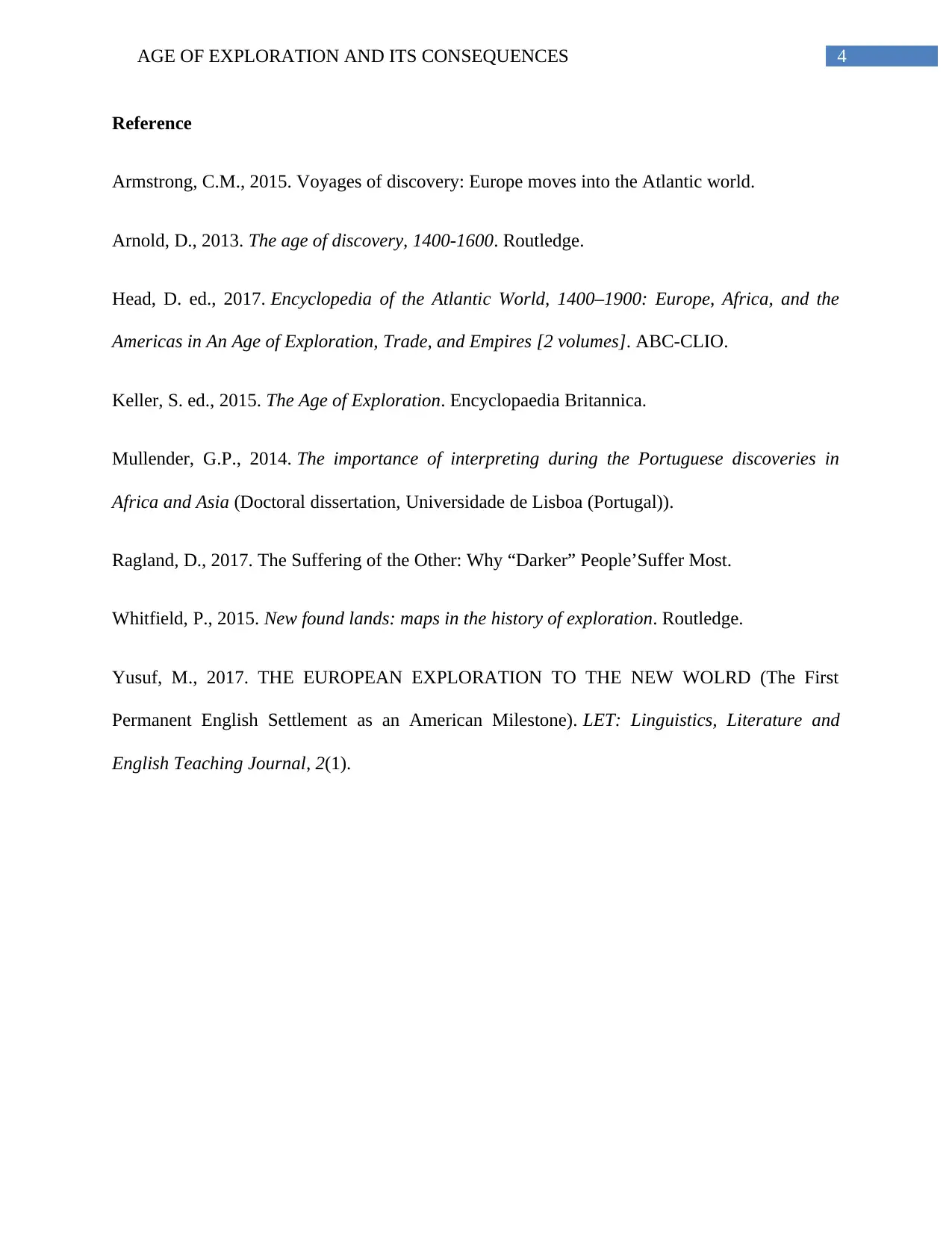
4AGE OF EXPLORATION AND ITS CONSEQUENCES
Reference
Armstrong, C.M., 2015. Voyages of discovery: Europe moves into the Atlantic world.
Arnold, D., 2013. The age of discovery, 1400-1600. Routledge.
Head, D. ed., 2017. Encyclopedia of the Atlantic World, 1400–1900: Europe, Africa, and the
Americas in An Age of Exploration, Trade, and Empires [2 volumes]. ABC-CLIO.
Keller, S. ed., 2015. The Age of Exploration. Encyclopaedia Britannica.
Mullender, G.P., 2014. The importance of interpreting during the Portuguese discoveries in
Africa and Asia (Doctoral dissertation, Universidade de Lisboa (Portugal)).
Ragland, D., 2017. The Suffering of the Other: Why “Darker” People’Suffer Most.
Whitfield, P., 2015. New found lands: maps in the history of exploration. Routledge.
Yusuf, M., 2017. THE EUROPEAN EXPLORATION TO THE NEW WOLRD (The First
Permanent English Settlement as an American Milestone). LET: Linguistics, Literature and
English Teaching Journal, 2(1).
Reference
Armstrong, C.M., 2015. Voyages of discovery: Europe moves into the Atlantic world.
Arnold, D., 2013. The age of discovery, 1400-1600. Routledge.
Head, D. ed., 2017. Encyclopedia of the Atlantic World, 1400–1900: Europe, Africa, and the
Americas in An Age of Exploration, Trade, and Empires [2 volumes]. ABC-CLIO.
Keller, S. ed., 2015. The Age of Exploration. Encyclopaedia Britannica.
Mullender, G.P., 2014. The importance of interpreting during the Portuguese discoveries in
Africa and Asia (Doctoral dissertation, Universidade de Lisboa (Portugal)).
Ragland, D., 2017. The Suffering of the Other: Why “Darker” People’Suffer Most.
Whitfield, P., 2015. New found lands: maps in the history of exploration. Routledge.
Yusuf, M., 2017. THE EUROPEAN EXPLORATION TO THE NEW WOLRD (The First
Permanent English Settlement as an American Milestone). LET: Linguistics, Literature and
English Teaching Journal, 2(1).
1 out of 5
Your All-in-One AI-Powered Toolkit for Academic Success.
+13062052269
info@desklib.com
Available 24*7 on WhatsApp / Email
![[object Object]](/_next/static/media/star-bottom.7253800d.svg)
Unlock your academic potential
Copyright © 2020–2026 A2Z Services. All Rights Reserved. Developed and managed by ZUCOL.